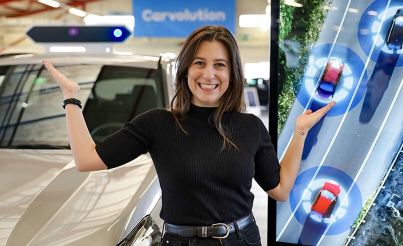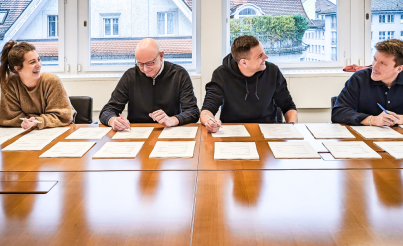Between e-commerce and Sharing Economy, an old idea is gaining new ground: the subscription business. It is turning more and more sectors upside down.
How much music do you have at home? This question may seem strange. But just a few years ago, it was quite normal to measure music by the metre. People bought vinyl records, later cassettes and CDs, and they built up real collections that they proudly cherished and nurtured.
Today, the sound is in the cloud. The success story of Spotify is perhaps the best description of how a company moves from a vested interest model to a subscription model, without making a big deal about this blatant change. Not so long ago, software was purchased on diskette and loaded onto the computer, today, it is fetched from the cloud - to be renewed annually. Recently, people used to buy new socks when the old ones had holes in them; today, they are sent home every month.
Before, everyone used to buy their own car and drive it to the car wash on Saturdays with pride of ownership; today, you have a car subscription. At least that's what the car manufacturers are counting on. Cadillac (in Zurich) and Volvo (all over Switzerland) will soon be launching subscription models: instead of leasing or even buying a car, you buy a subscription and have the ideal model delivered to your door if necessary, perhaps a convertible in the summer or a four-wheel drive in the winter.
The market grew in the background
The service model of the good old milkman is back, especially in the retail trade: from farm suppliers like Eiermaa and Farmy ("Hofpass") to menubox services such as Hellofresh, regular home delivery is making a comeback. In addition, Amazon's prime package has grown into a subscription giant, whose subscribers can have diapers or cans of vegetables delivered at all time, at least in the major markets, in addition to the usual films and e-books.
Subscriptions, which have appeared everywhere, have been perceived by the public and the experts, if at all, as mostly part of the online trade - or the Sharing Economy. This is where spectacular billion-dollar companies such as Zalando, Airbnb and Uber emerged. The Subscription Economy developed more quietly in the background, mainly within and outside existing companies.
The yoga fashion brand Lululemon has just announced a package in which, for 100 francs a year, subscribers receive regular training sessions and individual advice in addition to a pair of trousers.
Then Procter & Gamble launched its Gillette Club, where the modern gentleman can secure a supply of razor blades for 4 to 6 francs a month: "We are very satisfied with the development and quality of the knowledge we have gained about consumers," says Ralf Gehlen, Country Manager Switzerland at P&G. "It fully meets our expectations". While Switzerland has been the test market, the group has now started to roll out its razor club in other countries.
Airlines such as Eurowings and TAP have recently launched new multiple tickets for frequent flyers; Swiss also experimented last year with subscription packages for flights from Geneva, and the next steps are currently being studied. "Initial figures show that the flight pass test was very successful," said a spokeswoman.
What’s the Next Big Thing?
The first experts here sense the next "big thing" here - the Subscription Economy as a further step towards a different economic future. "Barron's", the American business magazine, recently found the main reason why Microsoft has suddenly become one of the most valuable companies in the world again thanks to its successful switch to the subscription model. Zuora, a software and consulting firm, has calculated that subscription sales have recently increased by 18 % per year - or more precisely: between January 2012 and mid-2018, additional subscription sales in Europe grew six times faster than the sales of the stock exchange-listed companies in the UK, France and Germany.
Subscription is a very old idea, which appeared in 17th century England: At that time, clever publishers wanted to secure themselves through pre-sales (subscriptions) and permanent contracts before starting to print a book for a significant amount of money. So what is new? What is suddenly going on?
To explain the revival - firstly - from the customer's point of view, you will encounter new attitudes: What is the point of owning something if occasional use is enough? People are looking for comfort, for the momentary, and it rarely depends on what they own. On the contrary, in the digital age, subscriptions open up to goods that don't wear out. Songs on Spotify always sound the same, without scratches; the subscribed car is replaced at any time. "Pride of ownership is losing its importance with many goods," says Samy Liechti, the founder of Blacksocks: "More and more people are content to simply use something appropriately. I support this thesis." Liechti is the inventor of the “sockscription”, a true pioneer in this business. As early as 1999, he began to wonder why he had to constantly look for new socks when they could be sent home on a regular basis. Today, his company Blacksocks has around 60,000 active customers, about 40 % of which are abroad. "We stand for a simple interface between man and underwear," says Liechti in professional jargon. Perfect for the Big Data era.
Secondly, while the growth of the subscription economy can be explained structurally, it appears to be a secondary branch of digital trade. This makes it increasingly important in parallel. If, for example, the fashion market on the Internet is growing, business opportunities for seasonal subscription offers or clothing packages will also arise.
Thirdly, If you look at the whole thing from a business management perspective, it becomes clear that subscription is synonymous with customer loyalty. At the same time, customers with open-ended contracts are a valuable source of information in the Big Data era.
"Our most important key figure is the lifetime value of the customer," says Samy Liechti: "The customer with the highest value has so far spent 14,600 francs. We know how many socks someone has received, when a customer takes a break or what the chances are that he or she will be able to reactivate the subscription. In these crazy times of Black Friday, that's precious."
"Device as a Service"
In the business-to-business sector in particular, the emphasis is increasingly on subscription rather than leasing. Instead of construction machinery, delivery vans or aircraft engines, modern corporations now buy subscriptions for apparatus or flight hours - the rest is paid for by the manufacturer. Digitec Galaxus has recently started offering IT packages for companies: “Device as a Service”, as the buzzword goes.
"Swiss companies are opening up to such models," says Diego Romero, "and we are noticing this trend." Romero is head of the business customer division of Digitec Galaxus, and he is also experiencing great interest in such subscription plans. "The manufacturers are reporting: Once a customer has chosen such a model, they usually stick to it." In short: Here too, a double interest drives the business. Customers can quickly adapt their IT park to their business development, staffing plan or technology. And providers simply have to recalculate: Every IT manufacturer knows the exact residual purchase value of his equipment - and can deduct this amount right from the outset. "If the residual value of a laptop is still 30 % after three years, the customer pays 70 % of the value of the goods, spread over 36 months," calculates Diego Romero. "In the end, he exchanges it - and doesn't have an old one lying around."
Fashion and rock 'n' roll
The package is all about convenience: a new kind of win-win world is emerging. Subscriptions are becoming the liaison for everything from the cosmetics box for the young woman to the online music course that Fender wants to keep its rock'n'roller skates onto the guitar necks. The basic idea fits almost every product and service: Sustainability replaces one-off offers - and by turning buyers into subscribers, it creates a more regular revenue stream.
Structures are still unclear: Who is in touch with customers? What is the role of manufacturers and what is the role of online retailers? Which distribution start-ups are going to organise the new subscription offers? This change will also create all sorts of problems.
The private jet subscription provider Surf Air has just had to cancel its European projects, including the flights planned from Zurich. Shortly after the announcement, it became clear that too few interested parties wanted to have a business jet on order for just under 4,000 francs a month. As for Adidas, it recently cancelled its "Avenue A" project in the United States - a subscription where a box of sporting goods was available for $600 every three months. Today, Adidas has replaced Avenue A with a membership program, the Creator's Club. For a fixed price, certain offers are received earlier, more exclusive, cheaper.
The principle is the same: to build customer loyalty. The rumours are already going around: clubs - that's going to be the next big thing.
Car subscriptions: the right car at the right time
In Switzerland, it starts with Volvo and Cadillac. Both brands are planning to offer their cars on a subscription basis this year. Those who wish to do so can, for example, have a mid-range SUV delivered and use the car for a price of 700 francs per month. The manufacturer takes care of insurance or repairs and the user can replace it again when a more practical model is appreciated in the summer.
The "Care by Volvo" and "Book by Cadillac" offers, as they are known, are already in force in Germany. And other manufacturers such as Porsche, Mercedes and Ford have launched such subscription tests in America. "Only three months after the start signal, we had already reached our target capacity - and with a minimum of advertising," reports Felix Weller, Cadillac's Vice President for Europe, about the first experiences in the Munich test market. Subscription customers are much younger than classic Cadillac buyers, with the largest age group appearing to be in the 30-40 age group. At present, the range of products and services on offer is still essentially complementary. The main objective of Book by Cadillac is to "bring interested parties into contact with our cars and brands," says Felix Weller. However, it seems clear that the shift from purchase to subscription - with the good old leasing in between - has now reached the automotive sector.
In addition to the manufacturers, brand-independent subscription providers are also involved. In Switzerland, Mobility's home country, several offers are already on the starting blocks: "Green class" from SBB, "Juicar" from Alpiq, "Carvolution" - an independent start-up - or "Upto", sponsored by the insurer Axa. The company has got off to an "excellent start", says Axa spokesperson Melanie Ade: "In the first three months, we were able to acquire twice as many customers as originally planned".
A strong willingness to pay
At first sight, competition between car manufacturers and independent subscription providers therefore appears to be emerging. But Luis Wittwer sees things in a positive light: "We are not positioning ourselves against Cadillac or Volvo," says the managing director of Carvolution, "but against the expensive processes and uncertainties involved in leasing and buying cars. When Volvo advertises the idea of car subscriptions on a large scale, then that's good for us too". Wittwer's calculation: In Switzerland, around 300,000 cars are bought every year, almost half of which are leased. "People have got used to the idea that you don't have to own a car".
In fact, a recent survey by the consulting firm Oliver Wyman revealed that around a quarter of Germans are basically interested in a car subscription; and three out of ten interested people could imagine giving up their private car in favour of a subscription model. "We see a market that is emerging," says Joachim Deinlein, partner at Oliver Wyman and author of the study. "There is an interesting customer base with a strong willingness to pay. But the offer still needs to be developed further. A lot of people don't even know that they could use such a subscription yet.
You can read the entire article here.
For more information about the Carvolution car subscription, click here.
Peugeot & Ford Sale
Discover various models with attractive discounts starting from CHF 299.- per month. Get your non-binding offer now and save with the sale.










